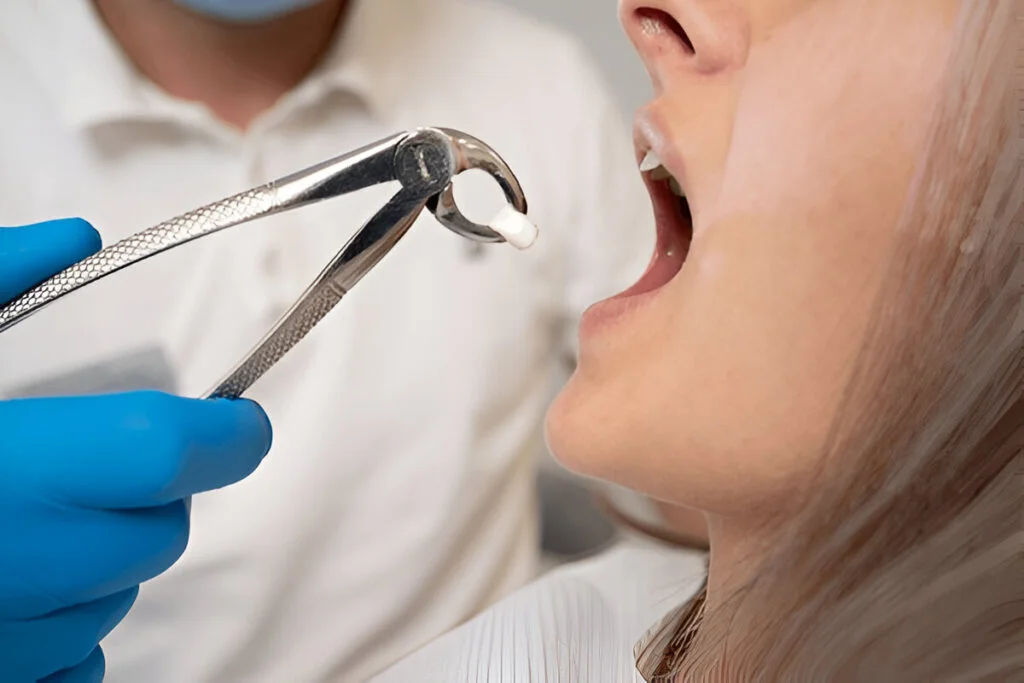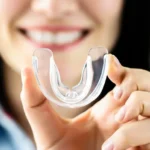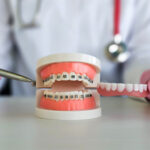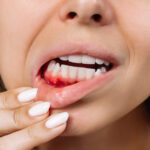Just been told you need a tooth extraction?
Take a deep breath—you’re not alone, and it’s totally normal to feel a little nervous. Right now, your mind might be racing with questions: Will it hurt? How long will it take to heal? What if something goes wrong?
Let’s be honest—tooth extraction sounds intense. But here’s the truth: most of the fear surrounding it comes from myths, not tooth extraction facts. You’ve probably heard stories from friends, read things online, or built up scary images in your head.
The good news? A lot of what you’ve heard just isn’t true.
We’re here to bust the most common myths about tooth extraction in Abu Dhabi, so you can walk into your appointment informed and confident.
Myth 1: Tooth extraction is extremely painful
Truth: It’s not as painful as you think
This is one of the biggest and scariest tooth extraction myths. Many people imagine unbearable pain during a tooth extraction. But the procedure is usually painless due to modern dental techniques and anesthesia.
Your dentist will numb the area with local anesthesia, so you won’t feel pain during the extraction. You may feel some pressure, but it’s not painful. After the procedure, any discomfort can usually be managed with painkillers and proper care.
Myth 2: It takes a long time to recover
Truth: Recovery is often quick and simple
Most people think they’ll be stuck in bed for days after a tooth extraction. That’s not true in most cases. While healing time can vary depending on the type of extraction and your overall health, most people feel better within 2 to 3 days.
Following your dentist’s instructions—like resting, avoiding hard foods, and not using a straw—can speed up your recovery.
Myth 3: You shouldn’t eat or drink after tooth extraction
Truth: You can eat—just be careful
You don’t have to starve after a tooth extraction. You just need to be smart about what you eat. For a few days, avoid hot, spicy, hard, or crunchy foods. Instead, eat soft, cool foods like yogurt, smoothies, mashed potatoes, and soups.
Also, remember to drink plenty of water—but avoid drinking through a straw. A straw can dislodge the blood clot and lead to a painful condition called dry socket.
Myth 4: All tooth extractions are the same
Truth: There are different types of extractions
Not all tooth extractions are the same. A simple extraction is done on a visible tooth that is easy to remove. A surgical extraction is more complex and is used for teeth that are broken, impacted, or below the gum line.
Your dentist will choose the right method based on your tooth’s condition. So don’t compare your experience to someone else’s. Each case is unique.
Myth 5: You only need a tooth extraction if you’re in pain
Truth: Not all problematic teeth cause pain
Some people think if a tooth doesn’t hurt, it must be okay. That’s not always true. A tooth might be damaged, decayed, or infected without causing pain. Dentists can see issues through X-rays and checkups before you even feel anything.
If your dentist recommends an extraction, trust that it will prevent future problems, even if your tooth isn’t hurting yet.
Myth 6: Tooth extraction will ruin your smile

Truth: There are many tooth replacement options
Worried about your smile after an extraction? Don’t be. Modern dentistry offers many ways to replace missing teeth, such as dental implants, bridges, and dentures.
Your dentist will help you choose the best solution to restore your smile and keep your mouth healthy. Removing a badly damaged tooth can improve your appearance in the long run.
Myth 7: You can’t go back to work for a week
Truth: Most people return to work the next day
Unless you had a complicated surgical extraction or your job involves heavy physical labor, most people can return to work or school within 1–2 days. Your dentist may suggest taking it easy, but you don’t have to put your life on hold for a week.
Just make sure you’re not doing anything too strenuous and follow your dentist’s instructions.
Myth 8: It’s better to save every tooth at all costs
Truth: Sometimes, extraction is the healthier choice
While it’s true that keeping your natural teeth is best when possible, sometimes removing a tooth is the healthiest option. If a tooth is badly infected, decayed, or causing crowding, an extraction can prevent bigger problems later.
Dentists try to save teeth when they can, but when that’s not possible, an extraction is the next best step for your oral health.
Myth 9: Tooth extractions are only for wisdom teeth
Truth: Any tooth can be extracted if needed
Wisdom teeth are commonly removed, but they are not the only ones that may need extraction. Other teeth may be removed because of infection, overcrowding, or preparation for braces.
So if your dentist suggests removing a different tooth, don’t be surprised—it’s actually quite common.
Myth 10: Bleeding after extraction is always a sign of trouble
Truth: Some bleeding is normal
Minor bleeding after tooth extraction is entirely normal. It usually stops within a few hours. Your dentist will give you gauze to bite down on and instructions to help stop the bleeding.
However, if the bleeding is heavy or continues beyond 24 hours, call your dentist. But don’t panic—minor bleeding is part of the healing process.

Ready for a pain-free tooth extraction?
At Marigold Dental & Orthodontic Clinic, we offer the best tooth extraction services with care, comfort, and precision. Whether it’s a simple extraction or a complex surgical procedure, our skilled and friendly team uses modern techniques to make your experience as smooth and painless as possible.
As the best dental clinic in Abu Dhabi, we prioritize your comfort, safety, and long-term dental health. Let us guide you through your extraction process with expert care and a gentle touch.
Don’t let myths hold you back—book your appointment today and take the first step toward a healthier smile!
As a final observation
Tooth extraction sounds scarier than it is. A lot of the fear comes from old stories and misunderstandings. With modern tools and skilled dentists, tooth extraction is a safe, quick, and effective way to protect oral health.
If your dentist recommends a tooth extraction, ask questions and share your concerns—but don’t let tooth extraction myths stop you from getting the care you need.







